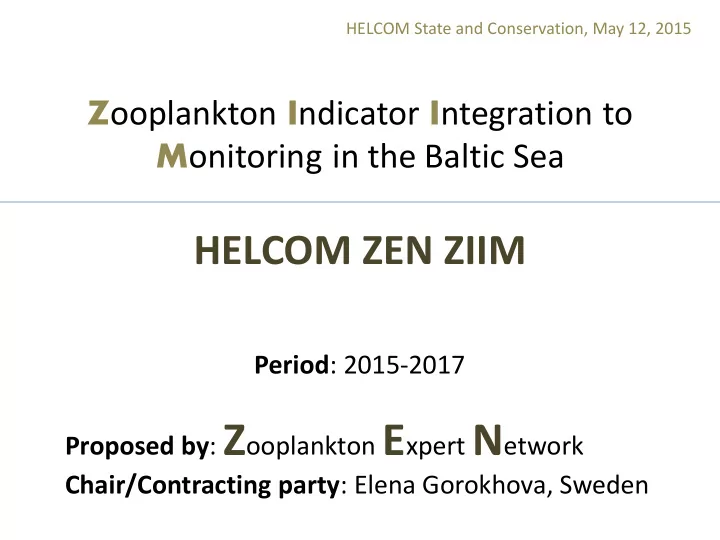

HELCOM State and Conservation, May 12, 2015 Z ooplankton I ndicator I ntegration to M onitoring in the Baltic Sea HELCOM ZEN ZIIM Period : 2015-2017 Proposed by : Z ooplankton E xpert N etwork Chair/Contracting party : Elena Gorokhova, Sweden
Importance of zooplankton assessment • Zooplankton - a main link in food webs and nutrient cycling – D4 domain! • Understanding zooplankton dynamics is crucial for an ecosystem approach to management • This approach is a cornerstone to HELCOM, Baltic Sea Action Plan, Marine Strategy Framework Directive and EU Common Fisheries Policy
Current status and need for development • ZEN QAI (Quality Assurance Issues) 2011- 2014; • Main results are summarized in the report, among others are: – Development of zooplankton-based indicators within CORESET I and II, – Initial recommendations for indicator integration in HELCOM-guided monitoring.
Zooplankton core indicator: MSTS Mean Size and Total Stock GES for Total Stock - combination of scores for mean body size in High grazing, zooplankton community Efficient grazing moderate food and total biomass; on larger limitation for phytoplankton, GES for MeanSize - discriminate well zooplankton, high moderate fish MeanSize energy transfer between reference and feeding efficiency, good stressed conditions ; conditions feeding for fish - ecologically meaningful Grazing on small (mechanisms of Low grazing, poor phytoplankton fish feeding moderate feeding responses can be conditions, conditions for explained); unproductive larval fish, poor - are not redundant with pelagic food web for postlarval fish each other. Total Stock Authored by HELCOM ZEN
Metrics used to calculate MSTS - Total zooplankton abundance (TZA) - obligatory for HELCOM-guided monitoring - Species, stages (size classes) - Total zooplankton biomass (TZB) - obligatory for HELCOM-guided monitoring - calculated using TZA and individual weights (species- and stage-specific) - Mean zooplankter size (MeanSize) - TZB:TZA ratio
Other zooplankton metrics evaluated for indicator properties • Total abundance, • Total biomass Some were • Copepod abundance found useful as • %Copepod abundance • Copepod biomass SUPPORTING • %Copepod biomass indicators in • Microphagous species biomass specific areas! • %Microphagous species biomass • Cladocera/Copepoda ratio • (Rotifera+Cladocera)/Copepoda ratio
MSTS : geographic applicability and data availability • Assessment Unit Level: BoBFI – 2 (Sub-basins) • The indicator is BoSFI applicable: ÅlandFI – Where COMBINE-based monitoring is GoFFI implemented Askö Landsort • Currently data are tested LHEI for: BB, BS, GoF, NBP, GoR, Anholt BIOR BMPJ2 GB, SEB, SB, K J56-K18 K32-41 • Standard monitoring Bornholm methods applied Baltic- wise
Further targets • To synthesize experience in MSTS application in different Baltic areas and critically examine cross-Baltic challenges and possible inconsistencies in MSTS applicability; • To propose GES-boundaries for MSTS for all relevant assessment units in the HELCOM area (provided that required data are available); • To define appropriate data reporting format for MSTS; • To identify the need of region-specific supporting indicators to facilitate interpretation of MSTS. Addressed in ZEN ZIIM
ZEN ZIIM will promote zooplankton-based indicators to follow-up the implementation of the Baltic Sea Action Plan and MSFD and to support the international Baltic regional zooplankton monitoring
Specific aims of ZEN ZIIM proposal • Test the applicability of zooplankton-based indicators in the Baltic Sea, with particular focus on regional assessment; • Harmonization MSTS with other food web indicators within the descriptor (D4) and establishing a dialogue with other groups involved in indicator work; • Revising recommendations for zooplankton biomass assessment, which is a pre-requisite for harmonizing indicator applicability Baltic-wise.
Activities • Training courses/workshops/seminars (2015-2017); • Revising COMBINE recommendations for zooplankton biomass assessment; • Regional MSTS implementation and specification of GES; • Contribution to current HELCOM activities and dialogue with scientific community, stakeholders and data holders.
Expert name Country Affiliation Eva Friis Møller Denmark NERI, Aarhus University ZEN participants Poul Seebach Denmark Zooplankton Id Arno Põllumäe Estonia Estonian Marine Institute, University of Tartu Maiju Lehtiniemi Finland SYKE Siru Tasala Finland SYKE Lutz Postel Germany Leibniz Institute for Baltic Sea Research, • 24 experts (ZEN QAI: 16), IOW Jörg Dutz Germany Leibniz Institute for Baltic Sea Research, IOW • 10 countries (ZEN QAI: 8) Matthias Paulsen Germany Geomar, Kiel Anda Ikauniece Latvia Latvian Institute of Aquatic Ecology Solvita Strake Latvia Latvian Institute of Aquatic Ecology Gunta Rubene Latvia Latvian Fisheries Agency Natalja Demereckiene Lithuania Environmental Protection Agency, Marine Research Department Egle Supiniene Lithuania Environmental Protection Agency, Marine Research Department Budget requested Jurate Lesutiene Lithuania Klaipeda University Evelina Griniene Lithuania Klaipeda University Piotr Margonski Poland Sea Fisheries Institute Bozenna Kaczmaruk Poland Department of Oceanography and Baltic Project management and Sea Monitoring Irena Telesh Russia Zoological Institute, RAS meeting facilitation: Elena Gorokhova Sweden Stockholm University 15 000 EUR + unused Lisa Mattsson Sweden Stockholm University Johanna Crona Sweden Umeå University funds from ZEN QAI Marie Johansson Sweden SMHI Strömberg Patrik Sweden SMHI Alexandra Teodósio Portugal Universidade do Algarve (OSPAR representative)
Expected results • Annual reports to HELCOM; • Revised monitoring guidelines for zooplankton, including biomass assessment guidelines ; • Contribution to the core indicator reports and data products regarding use of zooplankton in environmental status assessment , including to the HOLAS II project; • Final report.
Zooplankton Expert Network: from harmonized methods to harmonized assessements ZEN: Intercalibration workshop, 2006, Aranda.
Recommend
More recommend